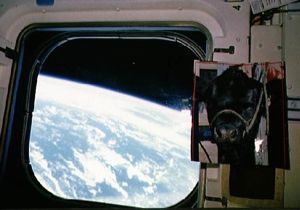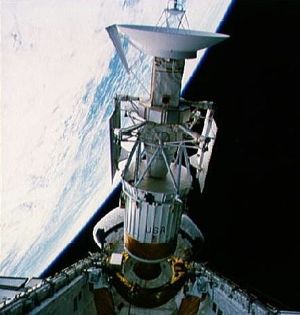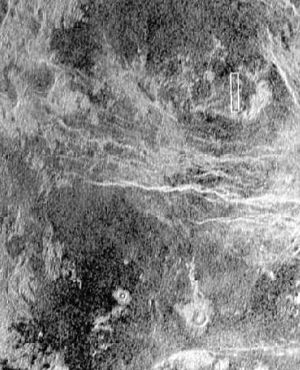
Home - Search - Browse - Alphabetic Index: 0- 1- 2- 3- 4- 5- 6- 7- 8- 9
A- B- C- D- E- F- G- H- I- J- K- L- M- N- O- P- Q- R- S- T- U- V- W- X- Y- Z
STS-30

STS-30
Artist concept titled "STS-30 Descent over California" produced by Rockwell
Credit: NASA
AKA: Atlantis. Launched: 1989-05-04. Returned: 1989-05-08. Number crew: 5 . Duration: 4.04 days.
Payloads: Deploy IUS with Magellan spacecraft. Fluids Experiment Apparatus (FEA). Mesoscale Lightning Experiment (MLE), Air Force Maui Optical Site (AMOS) experiment.
Orbits of Earth: 64. Distance traveled: 2,706,911 km. Orbiter Liftoff Mass: 118,441 kg. Orbiter Mass at Landing: 87,296 kg. Payload to Orbit: 20,833 kg. Payload Returned: 3,493 kg. Landed at: Concrete runway 22 at Edwards AFB, California. Landing Speed: 363 kph. Touchdown miss distance: 421 m. Landing Rollout: 3,137 m.
NASA Official Mission Narrative
Mission Name: STS-30 (29)
Atlantis (4)
Pad 39-B (10)
29th Shuttle mission
4th Flight OV-104
Crew:
David M. Walker (2), Commander
Ronald J. Grabe (2), Pilot
Norman E. Thagard (3), Mission Specialist 1
Mary L. Cleave (2), Mission Specialist 2
Mark C. Lee (1), Mission Specialist 3
Milestones:
OPF - Dec. 14,1988
VAB - March 11,1989
PAD - March 22, 1989
Payload:
MAGELLAN
Mission Objectives:
Launch:
May 4, 1989,2:48:59 p.m. EDT. Launch April 28 scrubbed at T-31 seconds due to problem with liquid hydrogen recirculation pump on number one main engine and vapor leak in four-inch liquid hydrogen recirculation line between orbiter and external tank. Repairs made and launch reset for May 4. Liftoff delayed until last five minutes of 64-minute window opening at 1:48 a.m.. EDT due to cloud cover and high winds at KSC Shuttle runway, violating return- to-launch site limits. Launch Weight: 261,118 lbs.
Orbit:
Altitude: 184nm
Inclination: 28.8 degrees
Orbits: 65
Duration: 4 days, 0 hours, 56 minutes, 28 seconds.
Distance: 1,681,997 miles
Hardware:
SRB: BI-027
SRM: 360Q/H004
ET : 29/LWT-22
MLP : 1
SSME-1: SN-2027
SSME-2: SN-2030
SSME-3: SN-2029
Landing:
May 8, 1989, 12:43:27 p.m. PDT, Runway 22, Edwards Air Force Base, Calif. Rollout distance: 10,295 feet. Rollout time: 64 seconds. Orbiter returned to KSC May 15,1989. Landing Weight: 192,459 lbs.
Mission Highlights:
Primary payload, Magellan/Venus radar mapper spacecraft and attached Inertial Upper Stage (IUS), deployed six hours, 14 minutes into Flight. IUS first and second stage fired as planned, boosting Magellan spacecraft on proper trajectory for 15-month journey to Venus. Secondary payloads: Mesoscale Lightning Experiment (MLE), microgravity research with Fluids Experiment Apparatus (FEA), and Air Force Maui Optical Site (AMOS) experiment.
One of five General Purpose Computers (GPC) failed and had to be replaced with a sixth onboard hardware spare. First time a GPC was switched on orbit.
More at: STS-30.
Family: Manned spaceflight. People: Cleave, Grabe, Lee, Thagard, Walker, Dave. Country: USA. Spacecraft: Atlantis. Projects: STS. Launch Sites: Cape Canaveral. Agency: NASA, NASA Houston. Bibliography: 4457.
 | STS-30 Credit: www.spacefacts.de |
 | STS-30 STS-30 Atlantis, OV-104, lifts off from KSC LC Pad 39B Credit: NASA |
 | STS-30 STS-30 aft flight deck onboard view of overhead window, Earth limb, cow photo Credit: NASA |
 | STS-30 STS-30 crewmembers Thagard and Lee during onboard cabin depressurisation test Credit: NASA |
 | STS-30 STS-30 Magellan spacecraft & IUS deployment from Atlantis' payload bay (PLB) Credit: NASA |
 | STS-30 STS-30 Magellan spacecraft & IUS deployment from Atlantis' payload bay (PLB) Credit: NASA |
 | STS-30 IUS with Magellan spacecraft drifts into space after STS-30 deployment Credit: NASA |
 | STS-30 Stratocumulus Clouds, eastern Pacific Ocean Credit: NASA |
 | STS-30 infra-red view of Cape Canaveral and Kennedy Space Center, Florida Credit: NASA |
 | STS-30 Cape Canaveral and Kennedy Space Center, Florida Credit: NASA |
 | STS-30 STS-30 Atlantis, OV-104, glides toward landing at EAFB, California Credit: NASA |
 | STS-30 Magellan radar image compared to high resolution Earth-based image of Venus Credit: NASA |
 | STS-30 Global view of Venus from Magellan, Pioneer, and Venera data Credit: NASA |
1989 May 4 - . 18:47 GMT - . Launch Site: Cape Canaveral. Launch Complex: Cape Canaveral LC39B. Launch Platform: MLP1. LV Family: Shuttle. Launch Vehicle: Space Shuttle.
- STS-30 - . Call Sign: Atlantis. Crew: Cleave, Grabe, Lee, Thagard, Walker, Dave. Payload: Atlantis F04 / Magellan [IUS]. Mass: 20,833 kg (45,928 lb). Nation: USA. Related Persons: Cleave, Grabe, Lee, Thagard, Walker, Dave. Agency: NASA Houston. Program: STS. Class: Manned. Type: Manned spaceplane. Flight: STS-30. Spacecraft Bus: Shuttle. Spacecraft: Atlantis. Duration: 4.04 days. Decay Date: 1989-05-08 . USAF Sat Cat: 19968 . COSPAR: 1989-033A. Apogee: 366 km (227 mi). Perigee: 361 km (224 mi). Inclination: 28.90 deg. Period: 91.80 min. Manned five crew. Deployed Magellan Venus probe. Payloads: Deploy IUS with Magellan spacecraft. Fluids Experiment Apparatus (FEA). Mesoscale Lightning Experiment (MLE), Air Force Maui Optical Site (AMOS) experiment..
1989 May 5 - .
- STS-30 - Wakeup Song: Superman - . Flight: STS-30. "Superman" film theme.
1989 May 6 - .
- STS-30 - Wakeup Song: Anchors Aweigh - . Flight: STS-30. "Anchors Aweigh" ; and a medley from their respective alma maters.
1989 May 7 - .
- STS-30 - Wakeup Song: Rocky - . Flight: STS-30. "Rocky" theme.
1989 May 8 - .
- STS-30 - Wakeup Song: A Hard Day's Night - . Flight: STS-30. "A Hard Day's Night" The Beatles.
1989 May 8 - .
- Landing of STS-30 - . Return Crew: Cleave, Grabe, Lee, Thagard, Walker, Dave. Nation: USA. Related Persons: Cleave, Grabe, Lee, Thagard, Walker, Dave. Program: STS. Flight: STS-30. STS-30 landed at 19:40 GMT. .
Back to top of page
Home - Search - Browse - Alphabetic Index: 0- 1- 2- 3- 4- 5- 6- 7- 8- 9
A- B- C- D- E- F- G- H- I- J- K- L- M- N- O- P- Q- R- S- T- U- V- W- X- Y- Z
© 1997-2019 Mark Wade - Contact
© / Conditions for Use